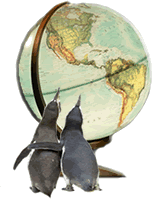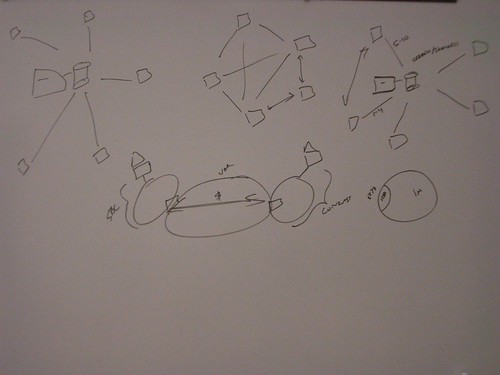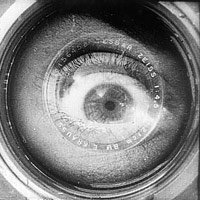This afternoon I attended a talk given by Bill Gates at Columbia University. The talk was a part of his university tour, probably prompted by the well documented braindrain happening at MS right now (Certain well known competitors seem to be following the strategy outlined in Good to Great – get the smartest people you can find “on the bus”, and then let them drive…).
Here are my raw notes.
I must say that this afternoon’s talk was a bizarre experience. Perhaps its all the theory stuff I have been reading lately, but I was in a very psychoanalytic, read between the lines, kind of mood, trying to pay as much attention to what he didn’t say, as to what he did.
First, he has clearly taken some lessons from Steve Jobs. He presented casually and demoed live software. One big difference – while Jobs enjoys demoing creative authoring tools, Gates spends most of his time demoing tools of consumption. He continues to treat his gadgets as receivers, not transmitters, and this is all getting a bit tiring.
Next, close to all the software contexts he described were business and work related. There was very little talk about socializing or play (save for the xbox, and socializing in that virtual space). It was eerie that when someone asked him what his greatest accomplishments were, he responded how much he loved work (and working at his foundation). All of his examples for the uses of ubiquitous computing were work/consumer related (auto tracking receipts for expense reports, shopping, collecting business cards when traveling, Location info – while in traffic (presumably while commuting)) — this is all summed up with his grand vision of the future smartphone as replacement for wallet.
Isn’t there something else the phone could replace? Could our phones become surrogate brains, man’s best friend, or personal assistants? Can’t we conjure up a better metaphor than wallets for how software will change the world? Will it do anything beyond making us better and more efficient shoppers?
The talk kept getting weirder – Gates played a video, which most of the audience thought was very funny. I will have to save my analysis for my Media and Cultural Theory class (or the comments), but it really threw me off.
Gates never mentioned Google, Firefox, or Linux. Did acknowledge the wikipedia (by name), freebsd, sendmail, and the NSCA browser. He even made two truly surprising statements regarding IP – after demoing that the new XBox 360 will connect to an IPod, an audience member asked if it would be able to play fairplay protected ACC files. Gates responded that it won’t be able to, because Apple won’t let him (Ha!), to which he added “its your music and you paid for it.” He also stated that “studios have gone overboard in protection scheme”, and ” will always have free and commercial software.”
Before the session, they passed around cards with potential questions (I am still not sure if the questioners were plants, reading these cards…).
Here were my, never asked questions:
1) Technology can bend towards good or evil. What can we do to insure that it is used for the Good? What is M$ doing to promote the use of its software for the Good.
2) In the upcoming world of omniscient surveillance, what role will M$ play in insuring individuality, privacy, and anonymity. What is M$ doing to contribute
 Filed by jonah at 11:16 am under ethics,fire
Filed by jonah at 11:16 am under ethics,fire
 In keeping with the Alchemist’s recent “
In keeping with the Alchemist’s recent “ 1 Comment
1 Comment Free as in ‘Free of pollutants’, ‘free of politics’, and ‘conducive to human freedom’, not ‘free as in fusion’ or ‘free as in beer’.
Free as in ‘Free of pollutants’, ‘free of politics’, and ‘conducive to human freedom’, not ‘free as in fusion’ or ‘free as in beer’. Well, midterms have come and gone, and somehow I managed to complete my two papers on time, somewhere between San Francisco and
Well, midterms have come and gone, and somehow I managed to complete my two papers on time, somewhere between San Francisco and  I had an interesting conversation with Brian Taptich, the VP of Business Development at
I had an interesting conversation with Brian Taptich, the VP of Business Development at  I attended
I attended 
 On Friday I had a chance to meet with a group of Artificial Intelligence researchers at Carnegie-Melon university. They demonstrated a working technology,
On Friday I had a chance to meet with a group of Artificial Intelligence researchers at Carnegie-Melon university. They demonstrated a working technology, 